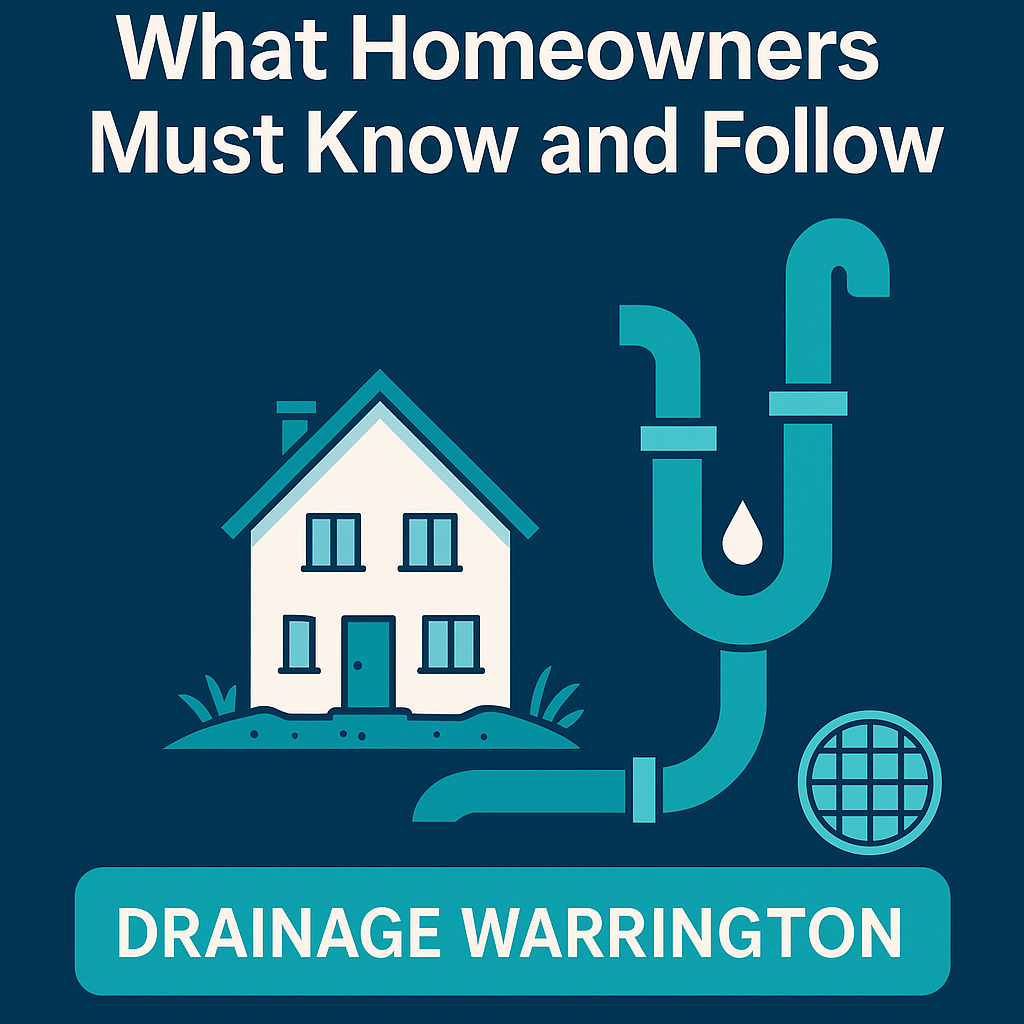Blocked drains, water pooling, or damp patches on your lawn? These issues may seem minor—until you realise you’re unknowingly breaching UK drainage regulations. For homeowners in Warrington, staying on top of local rules isn’t just about keeping your garden tidy—it’s about legal compliance, property safety, and even avoiding hefty fines. Let’s explore exactly what you need to know.
Why Drainage Regulations Matter in the UK
UK drainage regulations exist to protect homes, the environment, and public health. They’re designed to ensure wastewater is disposed of safely, without polluting the local water supply or damaging neighbouring properties.
Failing to follow them can lead to:
- Legal penalties and fines
- Costly repairs due to flooding or backflow
- Disruption to your neighbours’ drainage systems
If you’re planning any work involving drainage—extensions, driveways, landscaping, or bathroom upgrades—you must ensure compliance.
Types of Drainage Systems You Need to Know
In the UK, there are two primary drainage systems:
1. Foul Water Drainage
Handles water from bathrooms, kitchens, and washing machines. It must be connected to the public sewer or a treatment system.
2. Surface Water Drainage
Carries rainwater from roofs, driveways, and patios. This should never be connected to foul water systems unless approved.
Fact: The Environment Agency and your local council are strict about separation. Improper connections can cause contamination and fines.
What Drainage Regulations UK Homeowners Must Follow
1. Planning Permission & Building Regulations
Not all drainage works need planning permission, but major changes do. For example:
- Changing foul to surface water connections
- Installing new soakaways or drainage fields
- Connecting to public sewers
Tip from Drainage Warrington: Always check with Warrington Borough Council or consult with professionals before digging or connecting.
2. Consent to Discharge
If you’re not connected to the mains sewer and use a private system (like a septic tank), you’ll need a permit from the Environment Agency to discharge.
3. Sustainable Drainage Systems (SuDS)
New developments and driveways over 5m² must comply with SuDS standards to reduce flood risks.
4. Water Companies’ Right of Access
If any drains on your land serve multiple homes, they might be public. Water companies have the right to access or even repair them.
Common Drainage Problems That Indicate Non-Compliance
Homeowners often miss the early signs. If you spot any of these, it might mean your system isn’t up to code:
- Foul smells near outdoor drains
- Water backing up in sinks or toilets
- Constantly damp ground around inspection chambers
- Pools of water form after rain
These issues could indicate improper connections, blockages, or outdated pipework that breaches regulations.
How Professional Drain Cleaning Keeps You Compliant
Ignoring regular drain maintenance is a shortcut to regulatory trouble. Here’s how hiring a pro helps:
Regular Drain Maintenance
Keeps systems flowing smoothly and reveals potential compliance risks early.
Professional Drain Inspection
Specialists use CCTV and other tools to identify illegal connections or system failures.
Comprehensive Drain Services Include:
- Drain unblocking
- High-pressure jetting
- Inspection & reporting for legal compliance
- Repairs and re-routing for non-compliant drains
At Drainage Warrington, we work to the Drain Safety Standards UK and always comply with local building regulations.
Real-World Example: A Warrington Drainage Fix Gone Right
A homeowner in Grappenhall unknowingly had their roof drains connected to the foul system—violating both SuDS and sewerage rules. After months of unpleasant odours and rising bills, they called Drainage Warrington. Our team:
- Conducted a CCTV survey
- Rerouted the surface water to a legal soakaway
- Notified the council and resolved the issue
Your Responsibilities as a Homeowner
Here’s a quick checklist to stay on the right side of the law:
- Know the type of drainage system on your property
- Get proper consents for alterations
- Keep systems well-maintained
- Never connect surface water to foul drains without approval
- Hire a professional like Drainage Warrington for regular inspections
Final Thoughts
Following UK Drainage Regulations is about more than ticking boxes—it’s about protecting your property, your community, and your peace of mind. Whether you’re extending your home, replacing a patio, or noticing unusual drain smells—don’t guess. Get it checked by the experts at Drainage Warrington. Call us today on 01925 568391 for professional advice and fast service.



 Blog
Blog